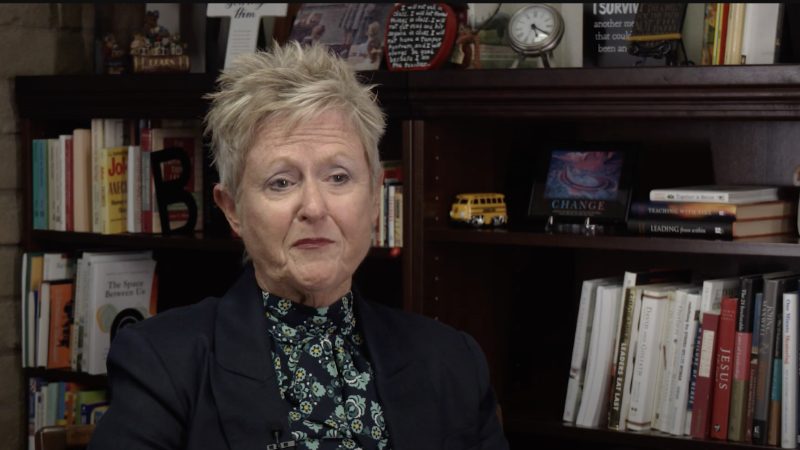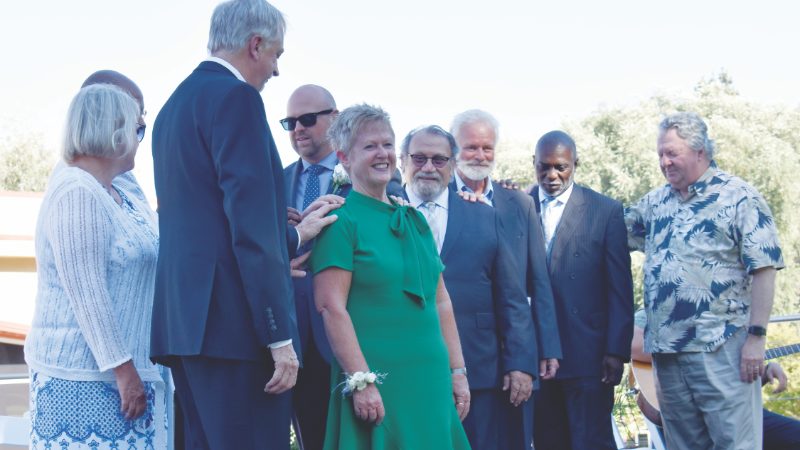With his preface, dated May 30, 1988, Fred Veltman signed off on the “Full Report of the Life of Christ Research Project.” Shortly thereafter, he submitted his massive report of over 2,500 pages to the Life of Christ Research Project Review Committee, a specially appointed oversight committee of the General Conference of Seventh-day Adventists.


When commissioned in 1980 in the wake of many published but limited studies into Ellen White’s literary borrowing, the project was to have been a two-year, comprehensive research investigation of the degree to which she used sources in writing on the life of Christ, especially in the 87 chapters of The Desire of Ages.
Veltman quickly realized the scope of this herculean commission and established some significant limits: 1) He decided to examine only 15 randomly selected chapters (17%) of the 87 chapters of The Desire of Ages. 2) He limited the search for potential literary sources to 19th-century, non-Adventist “lives of Christ” and related material. 3) He restricted his investigation largely to the occurrences and degrees of verbal similarities between Ellen White’s material and that of her potential sources and did not consider her parallels of their content or of their sequence of ideas. Although the restrictions helped Veltman focus his work, the project extended to nearly eight years from the intended two.
Despite these limits, Veltman’s investigation and report were extremely important and remain very significant. His study represents the most comprehensive investigation of a major segment of Ellen White’s writings and the most extensive and largest report of investigative findings to date. The study traced the history of concerns about the originality of Ellen White’s writing, her reliance on assistants, and the history of research into such matters. Veltman created and employed a method of investigating her use of sources—in this case applied to her writing on the life of Christ—even if he was not always consistent in applying it. He studied these writings longitudinally, which included a textual tradition of her earlier, related writings that spanned at least 40 years. Despite his personal beliefs, Veltman approached the work objectively, openly acknowledging limitations and suggesting areas for future research.

The condensed form of Veltman’s report is required because the original version is excessively long, complex, and technical for most readers, including non-specialists and those with academic interests. Veltman acknowledged these challenges. Furthermore, the report was never published in the normal sense. He submitted it to those who commissioned it, who, in turn, made copies for various libraries and study centers. It has remained buried in these archival environments ever since, largely unknown to almost all Adventists except those who research Ellen White, her writings, or Adventist history.
My book, The Desire of Ages and its Sources, a condensed edition of Fred Veltman’s “Full Report of the Life of Christ Research Project,” is intended for all interested persons in hopes that it will provide not only a more user-friendly way for general readers to encounter its values than the original account but also a stimulus for researchers to proceed to examine and critique Veltman’s data and conclusions in its original form and to embrace his recommendations for future investigation. The book faithfully represents Veltman’s assignment, purposes, methods, analyses, and findings throughout his preface and 18 chapters and does so in his voice and with his structure and organization. The condensed product retains the original wording, spelling, grammar, and syntax of all such quoted material included.

In hindsight, it must be recognized that, despite his extensive study and massive report, Veltman’s conclusions are inherently limited. He 1) did not examine 72 chapters (83%) of The Desire of Ages; 2) did not search for potential sources among Adventist writers or, for the most part, in non-Adventist homiletical or devotional material; and 3) largely did not consider Ellen White’s literary dependence on the content and idea flow of her sources.
Despite its self-imposed and other limits and notwithstanding its gaps and shortcomings, Veltman’s research was, and remains, very important. It deserves more than the scant notice it received upon completion 35 years ago and continues to experience today. Veltman acknowledged all this—its limits, its gaps, its tepid reception, and its eventual burial; but he also noted its timeliness, its importance, and its calls for future study. He acknowledged uncertainty in his findings. We commend him. His report should be preserved and made widely available.
_____________________________
Warren Trenchard is professor emeritus of New Testament and early Christian literature, tenured, at La Sierra University.
Un informe que merece estar disponible y ser estudiado
Por Warren Trenchard
Con su prefacio, fechado el 30 de mayo de 1988, Fred Veltman firmó el «Informe Completo del Proyecto de Investigación de la Vida de Cristo». Poco después, presentó su enorme informe de más de 2.500 páginas al Comité de Revisión del Proyecto de Investigación de la Vida de Cristo, un comité de supervisión especialmente designado por la Conferencia General de los Adventistas del Séptimo Día.


Cuando se encargó en 1980 a raíz de muchos estudios publicados pero limitados sobre las apropiaciones literarias de Ellen White, el proyecto debía haber sido una investigación exhaustiva de dos años sobre el grado en que ella usaba a otros autores al escribir sobre la vida de Cristo, especialmente en los 87 capítulos de El deseado de todas las gentes.
Veltman se dio cuenta rápidamente del alcance de esa hercúlea comisión y estableció algunos límites significativos: 1) Decidió examinar solo 15 capítulos seleccionados al azar (17%) de los 87 capítulos de El deseado de todas las gentes. 2) Limitó la búsqueda de posibles fuentes literarias a las «vidas de Cristo» por no adventistas del siglo XIX y material relacionado. 3) Restringió su investigación en gran medida a las ocurrencias y grados de similitudes verbales entre el material de Ellen White y el de sus fuentes potenciales, y no consideró sus paralelos de contenido o de su secuencia de ideas. Aunque las restricciones ayudaron a Veltman a enfocar su labor, el proyecto se extendió a casi ocho años de los dos años previstos.
A pesar de esos límites, la investigación y el informe de Veltman fueron extremadamente importantes y siguen siendo muy significativos. Su estudio representa la investigación más completa de un segmento importante de los escritos de Ellen White y el informe más extenso y más grande de hallazgos de investigación hasta la fecha. El estudio trazó la historia de las preocupaciones sobre la originalidad de los escritos de Ellen White, su dependencia de sus asistentes y la historia de la investigación sobre tales asuntos. Veltman creó y empleó un método para investigar del uso por Ellen White de otros, en este caso aplicado a sus escritos sobre la vida de Cristo, incluso si no siempre fue consistente en aplicarlo. Estudió esos escritos longitudinalmente, lo que incluía una tradición textual de los escritos anteriores relacionados de Ellen White que abarcaban al menos 40 años. A pesar de sus creencias personales, Veltman abordó su labor de manera objetiva, reconociendo abiertamente las limitaciones y sugiriendo áreas para futuras investigaciones.

Una forma condensada del informe de Veltman era necesaria porque la versión original es excesivamente larga, compleja y técnica para la mayoría de los lectores, incluidos los no especialistas y los que tienen intereses académicos. Veltman reconoció esos desafíos. Además, el informe nunca se publicó en el sentido tradicional. Lo entregó a quienes lo encargaron, quienes, a su vez, hicieron copias para diversas bibliotecas y centros de estudio. Ha permanecido enterrado en esos archivos desde entonces, en gran parte desconocido por casi todos los adventistas, excepto para aquellos que investigan a Ellen White, sus escritos o la historia adventista.
Mi libro, The Desire of Ages and its Sources [El deseado de todas las gentes y sus fuentes], una edición condensada del «Informe Completo del Proyecto de Investigación de la Vida de Cristo» de Fred Veltman, está destinado a todas las personas interesadas con la esperanza de que proporcione no solo una forma más fácil de leer para que los lectores en general encuentren los valores del relato original, sino también un estímulo para que los investigadores procedan a examinar y criticar los datos y conclusiones de Veltman en su forma original y acepten sus recomendaciones para futuras investigaciones. El libro representa fielmente la tarea, los propósitos, los métodos, los análisis y los hallazgos de Veltman a lo largo de su prefacio y 18 capítulos, y lo hace con la voz y con la estructura y organización usados por Veltman. El producto condensado conserva la redacción, la ortografía, la gramática y la sintaxis originales de todo el material citado incluido.

En retrospectiva, debe reconocerse que, a pesar de su extenso estudio y su masivo informe, las conclusiones de Veltman son inherentemente limitadas. 1) no examinó 72 capítulos (83%) de El deseado de todas las gentes; 2) no buscó fuentes potenciales entre escritores adventistas o, en su mayor parte, en material homilético o devocional no adventista; y 3) en gran medida no consideró la dependencia literaria de Ellen White del contenido y el flujo de ideas de sus fuentes.
A pesar de sus límites autoimpuestos y de otro tipo, y a pesar de sus lagunas y deficiencias, la investigación de Veltman fue, y sigue siendo, muy importante. Merece más que la escasa noticia que recibió al finalizarse hace 35 años y que sigue experimentando hoy en día. Veltman reconoció todo eso: sus límites, sus lagunas, su tibia recepción y su eventual entierro; pero también señaló su oportunidad, su importancia y sus llamados a estudios futuros. Reconoció incertidumbre en sus hallazgos. Lo felicitamos. Su informe debe preservarse y difundirse ampliamente.
_____________________________
Warren Trenchard es profesor emérito de Nuevo Testamento y literatura cristiana primitiva, titular en La Sierra University.





